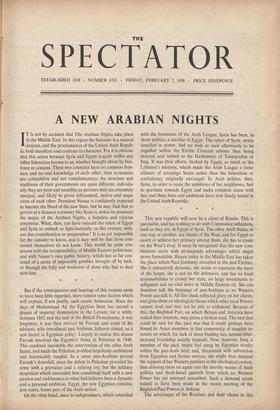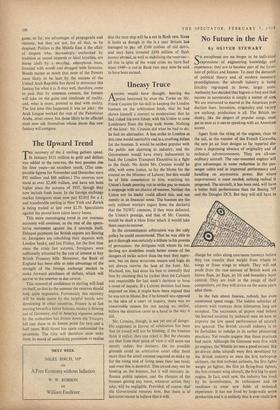A NEW ARABIAN NIGHTS
IT is not by accident that The Arabian Nights take place in the Middle East. In this region the fantastic is a natural denizen, and the proclamation of the United Arab Repub- lic both manifests and confirms its character. For it is obvious that this union between Syria and Egypt is quite unlike any other federation known to us, whether brought about by fear, force or consent. These two countries have no common fron- tiers and no real knowledge of each other; their economies are competitive and not complementary; the structure and traditions of their governments are quite different; individu- ally they are poor and unstable; as partners they are extremely unequal, and likely to prove self-centred, restive and suspi- cious of each other. President Nasser is confidently expected to become the Head of the new State, but he may find that to govern at a distance a country like Syria is, unless he possesses the magic of the Arabian Nights, a hopeless and ruinous enterprise. What, then, can have induced the rulers of Egypt and Syria to embark so light-heartedly on this venture, with- out due consideration or preparation? It is as yet impossible for the outsider to know, and it may well be that those con- cerned themselves do not know. This would be quite con- sonant with the irresponsibility of Middle Eastern politicians, and with Nasser's own public history, which has so far con- sisted of a series of impossible gambles brought off by luck, or through the folly and weakness of those who had to deal with him.
But if the consequences and bearings of this venture seem to have been little regarded, there remain some factors which will explain, if not justify, such erratic behaviour. Since the days of Muhammad Ali the Egyptian State has nursed a dream of imperial domination in the Levant; for a while, between 1882 and the end of the British Protectorate, it was forgotten; it was then revived by Farouk and some of his advisers, who introduced pan Arabism, hitherto absent, as a new factor in Egyptian policy. Largely to realise this dream Farouk involved the Egyptian Army in Palestine in 1948. This rendered inevitable the intervention of the other Arab States, and made the Palestine problem hopelessly embittered and inextricably tangled. In a sense pan-Arabism proved Farouk's downfall, since the defeat in Palestine provided his army with a grievance and a rallying cry; but the military despotism which suceeeded him committed itself with a new passion and recklessness to what had hitherto been a dynastic and a personal ambition. Egypt, the new Egyptian coristitu,. tion states, forms part of the Arab nation.
On the other hand, since its independence, which coincided with the formation of the Arab League, Syria has been, in Arab politics, a satellite of Egypt. The rulers of Syria, newly installed in power, had no wish so soon afterwards to be engulfed within the Fertile Crescent scheme then being mooted, and submit to the Hashemites of Transjordan or Iraq. It was their efforts, backed by Egypt, as much as the Lebanon's mistrust, which made the Arab League a loose alliance of sovereign States rather than the federation or confederacy originally envisaged. In Arab politics, then, Syria, in order to resist the ambitions of her neighbours, had to gravitate towards Egypt and make common cause with her; and these fears and ambitions have now finally issued in the United Arab Republic.
This new republic will now be a client of Russia. This is inevitable, and has nothing to do with Communist influences, such as they are, in Egypt or Syria. The other Arab States, in one way or another, are clients of the West, and for Egypt to assert or achieve her primacy among them, she has to count on the West's rival. It must be recognised that the new com- bination starts with propaganda advantages which might prove formidable. Russia today in the Middle East has taken the place which Nazi Germany occupied in the mid-Thirties. She is attractively dynamic, she seems to represent the wave of the future, she is not on the defensive, and has no local responsibilities to cramp her style, no large investments to . safeguard and no vital stake in Middle Eastern oil. She can therefore talk the language of pan-Arabism as no Western Power can talk it. All this sheds reflected glory on her clients, and gives them an ideological thrust which other local Power's cannot rival, and may not be able to withstand. Because of this, the Baghdad Pact, on which Britain and America have staked their interests, may prove a broken reed. The best that could be said for this pact was that it could perhaps have bound its Asian members in that community of tangible in- terests on which, for lack of more binding ties, normal inter- national friendship usually depends. Now, however, Iraq, a member of the pact, might feel stung by 'Egyptian rivalry within the pan-Arab field; and, threatened with subversion from Egyptian and Syrian sources, she might then demand' the support of her Western partners in the ideological contest, thus drawing them on again into the marshy wastes of Arab politics and Arab-Israel quarrels from which no Western Power has yet emerged unscathed. Such a demand seems indeed to have been made at the recent meeting of the Baghdad Pact Powers in Ankara.
The advantages of the Russians and their clients in this game, so far, are advantages of propaganda and rhetoric, but they are not, for all that, to be despised. Politics in the Middle East is the affair of despots who, increasingly unchecked by tradition or vested interests or local loyalties, are borne aloft by a swaying, amorphous mass, frenzied with words and drugged with fantasies. Words matter so much that none of the Powers most likely to be hurt by the success of the United Arab .Republic has dared to denounce this fantasy for what it is. It may well, therefore, come to pass that by common consent, the fantasy will take on the guise and similitude of reality, and, what is more, pretend to deal with reality. The last time this happened it was no joke : the Arab League worked the ruin of the Palestinian Arabs. Absit omen, but those likely to be affected must now ask themselves whose doom this new fantasy will compass.



































 Previous page
Previous page